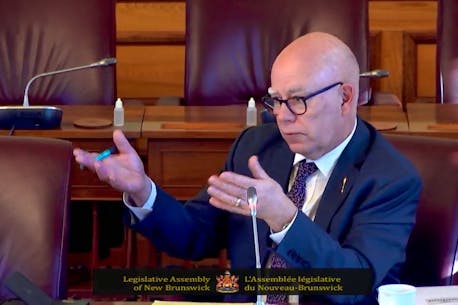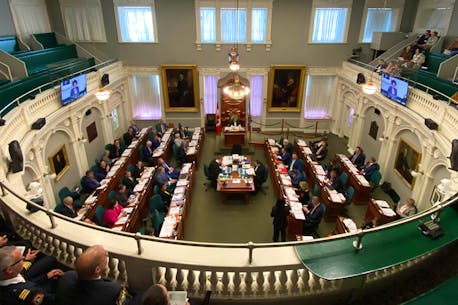Access to information: For Shelly Hipson, the price is $2,265
Shelly Hipson was fed up.
For months, there were rumblings that Tim Houston’s government would help her husband Kevin Doane, and hundreds of other fishermen whose gear was destroyed in the Shelburne County wildfire.
When the worst forest fire on record in Nova Scotia hit last May, her husband had about $50,000 worth of gear (including 100 lobster traps) stored outside his barn in Roseway.
All of it was destroyed. Because it was stored outside, the gear wasn’t covered by insurance. Her husband, a volunteer fireman, happened to be fighting the fire as his gear turned to ash.
In the weeks after, the Department of Fisheries and Aquaculture called a meeting with fishermen in the county, assuring them that help was on its way.
Fall arrived with no update and no funding announcement. Hipson was suspicious. She and her husband were calling the provincial Fisheries office almost daily looking for an update. Feeling stonewalled, she filed a freedom of information request with the department.
She made the request at the end of October, asking for internal correspondence, reports and text messages about the fishers who lost fishing gear in the Barrington Lake Fire. She also specifically inquired about the meeting between fishers and staff of the department.
The department responded eight days later with a letter, including a fee estimate for searching and processing the records she had requested. It was $2,265.00. It also wanted a deposit of $1,332.50 “before further processing of your request would continue.”
‘Not significant enough’
She asked the department to have the fee waived but got nowhere. Under the province's freedom of information law, it’s up to the government department to decide what amount it will charge. The department can also waive any fee, if it agrees releasing the information is clearly in the public interest. It didn’t.
“Your request is broad, and the Department is of the belief that the importance to the public is not significant enough to justify the transfer of these costs to Nova Scotia taxpayers.”
Hipson was shocked.
“They were just trying to shut me down,” she said.
“I thought that the government were just stringing along the fishermen who were devasted by the fire. I wanted to know what these public officials were saying in the background. We pay their salaries and we wanted to know are they really going to help them.”
Toby Mendel, executive director Halifax-based Centre for Law and Democracy, says the fee is excessive. He says the government should be charging only the cost of copying and sending records to the person making the request.
At the federal level, a freedom of information request requires only a $5 application fee. The fee is the same in Nova Scotia. The difference is Ottawa doesn't charge any additional fees for reproducing documents and sending them.
“Under international law, access to information is a human right,” said Mendel. “It’s also a quasi-constitutional right.
“You shouldn’t have to pay to exercise your rights.”
SaltWire asked the Department of Fisheries to provide a basis for the fee, including a breakdown of the costs involved.
We did not get a breakdown.
A lot of work
JoAnn Alberstat, a spokesperson for the department, said applicants receive a fee estimate based on the scope of the work and the number of hours needed to complete it. She said in this instance, fulfilling the request would involve a considerable amount of work.
She said departments will work with applicants to reduce or eliminate fees wherever possible. Applicants can also request a review by the office of the Information and Privacy Commissioner.
Wayne MacKay, a Dalhousie University law professor, says that none of this is good enough. MacKay, who has expertise in privacy law, says Nova Scotia’s access to information structure is among the worst in the country.
Hipson’s case is just one example, said MacKay.
“In order for it to be effective it has to be accessible,” said MacKay. “If you're going to charge large fees for people to get access to information, you’re limiting the power of the act. You’re also likely disenfranchising or denying access to information to people who don't have the means to pay for it.”
The province is doing an internal review of the Freedom of Information and Protection of Privacy Act, and the Centre for Democracy has made submissions calling for an overhaul. Its 23-page submission included a recommendation to abolish processing fees. It also calls for commissioner Tricia Ralph to have the authority to make orders that are binding, and to have the power to enforce them.
Hiding information, critics say
Nova Scotia is the only province where the privacy commissioner is not an independent office of the legislature.
Houston promised during the last election to change that. He hasn’t.
Critics have complained that the act is used by government to hide information it doesn't want the public to know.
Mendel says that charging fees is one way. The long list of exemptions — types of information that can’t be released — is another. This includes “sensitive” business information, personal information and reports prepared for cabinet.
Mendel’s group is also zeroing in on the four-year backlog at the commissioner’s office. “The commissioner does not have the resources she needs. A four-year delay in getting information utterly voids the benefit of this act,” said Mendel.
The Centre for Law and Democracy offered to meet with the committee
now reviewing Nova Scotia’s freedom of information law but was turned
down.




No comments:
Post a Comment